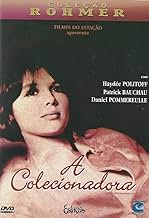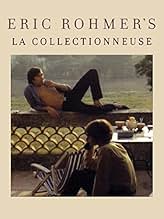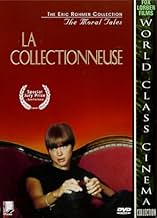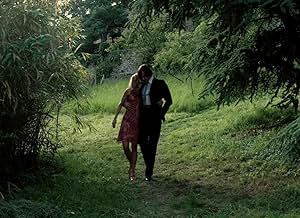La collectionneuse
- 1967
- Tous publics
- 1h 26min
NOTE IMDb
7,3/10
10 k
MA NOTE
Eloge de la vacuité entre protagonistes flemmards, dans l'interlude d'une cohabitation en villégiature. Haydée est-elle aussi creuse que laisserait présager sa futilité (elle accumule les fl... Tout lireEloge de la vacuité entre protagonistes flemmards, dans l'interlude d'une cohabitation en villégiature. Haydée est-elle aussi creuse que laisserait présager sa futilité (elle accumule les flirts) ? Adrien d'abord la snobe, puis s'en agace, Haydée échappe. [255]Eloge de la vacuité entre protagonistes flemmards, dans l'interlude d'une cohabitation en villégiature. Haydée est-elle aussi creuse que laisserait présager sa futilité (elle accumule les flirts) ? Adrien d'abord la snobe, puis s'en agace, Haydée échappe. [255]
- Réalisation
- Scénario
- Casting principal
- Récompenses
- 2 victoires et 1 nomination au total
Mijanou Bardot
- Carole
- (as Mijanou)
Eugene Archer
- Sam
- (non crédité)
Brian Belshaw
- Haydée's boyfriend
- (non crédité)
Pierre-Richard Bré
- Homme dans l'auto
- (non crédité)
Donald Cammell
- Garçon à St-Tropez
- (non crédité)
Alfred de Graff
- Touriste perdu
- (non crédité)
Avis à la une
La Collectionneuse is a fine example how consistent Eric Rohmer was throughout his Moral Tales series. The story isn't important here, its the intensity of each scene and the tension among the characters till the last scene. Subtle jump cuts in the storyline can make you pause & arrive at your own hypotheses about how the characters are feeling in the following scenes. This is a visual treat - whether its the sights & sounds of the reviera house where most of the movie takes place, or the shots of beach or Haydee Politoff's delicious lips. You never begin to hate or love any character at any point - but they stay on your mind long after the movie is over. The characters, adrian, haydee & daniel exude human rawness - none are perfect or simplistic. As a viewer, I could not take anyone's side. They all seek power in their own ways, while exposing their sensitivies equally. Its a curious caricature of the complexities around love and life. Rohmer uses symbols like antiques to express how the relationships are built and broken. I could watch it again & again. A delightful Rohmer classic - its poetic, with a pacing that works as a meditation of sorts.
A young man (Patrick Bauchau) parts with his fiancée to vacation in the south of France, where he plans to catch up with an old friend and spend his time in solitude. His holiday idyll is perturbed by the presence of a young woman (Haydée Politoff), who he says is not his type, but spends an awful lot of his time thinking about. She's sexually free and while in search of what she's looking for in life, sleeps with various men, a fact that gets under his skin.
The film is appealing aesthetically because through various small observational details in the surroundings and in the introspective silences he allows in, Éric Rohmer transports us to this place and its feeling. Politoff is also appealing to say the least, and her character has such an innocent simplicity about her that she's charming to watch. These are the things that made the film for me.
What I disliked about it was the protagonist, who provides the narration and the point of view of the film. While Rohmer is making a point about male insecurity and this guy's issues (as well as the other guy there, who's also an idiot), I have to say, he's so cold and judgmental that he's not likeable. I would have loved a version of this film that was made from Haydée's perspective. To its credit, through dialogue she is allowed to express her opinions, e.g. That he should mind his own business, and her boredom as he prattles on with his tedious pseudo-intellectualism. The art dealer also provides quite a takedown of the young man's not working and general laziness. He seems empty as a person and I suppose we're meant to recognize that and compare it to Haydée, who presumably goes off to Italy at the end and gets more enjoyment out of life. It's just unfortunate that the film, through its title and its narration, seems to share some of the viewpoint of the young man.
Overall, however, I liked this film both times I've watched it, and thought it was wisely kept at just 83 minutes. It makes me feel as though I was on holiday, and the images of Haydée Politoff are indelible.
The film is appealing aesthetically because through various small observational details in the surroundings and in the introspective silences he allows in, Éric Rohmer transports us to this place and its feeling. Politoff is also appealing to say the least, and her character has such an innocent simplicity about her that she's charming to watch. These are the things that made the film for me.
What I disliked about it was the protagonist, who provides the narration and the point of view of the film. While Rohmer is making a point about male insecurity and this guy's issues (as well as the other guy there, who's also an idiot), I have to say, he's so cold and judgmental that he's not likeable. I would have loved a version of this film that was made from Haydée's perspective. To its credit, through dialogue she is allowed to express her opinions, e.g. That he should mind his own business, and her boredom as he prattles on with his tedious pseudo-intellectualism. The art dealer also provides quite a takedown of the young man's not working and general laziness. He seems empty as a person and I suppose we're meant to recognize that and compare it to Haydée, who presumably goes off to Italy at the end and gets more enjoyment out of life. It's just unfortunate that the film, through its title and its narration, seems to share some of the viewpoint of the young man.
Overall, however, I liked this film both times I've watched it, and thought it was wisely kept at just 83 minutes. It makes me feel as though I was on holiday, and the images of Haydée Politoff are indelible.
In The Collector, the first feature-length film of the Six Moral Tales series, mind-games, strategies, and overt manipulation thwart the possibility of satisfying relationships. The 54-minute film is beautifully photographed and has an elegance, charm, and wit that bears favorable comparison with his more acclaimed works. Adrien (Patrick Bauchau), an art dealer, and Daniel (Daniel Pommereulle), a painter spend the summer in a house on the French Riviera. Also vacationing there is Haydee (Haydee Politoff), an elegant but rather aloof young woman who sleeps with many boys in the area and has earned the title of "collectionneuse", a collector of men. Adrien, smug and self-centered in a charming sort of way, is interested in Haydee but tells himself that her promiscuity is a trick for him to seduce her and he refuses.
The summer turns into a love triangle with Adrien convincing Daniel to pursue Haydee to ease the pressure of his own conflict between his rationalizing intellect and his passions. In the moral scheme of things, Haydee may represent the sexual revolution of the 60s and Adrien that of traditional morality, yet the film takes no sides, presenting the issues without judging the characters and giving us much to think about. The Collector is perhaps the most philosophical of the six but in the end the pursuit without passion leads to a feeling of emptiness and missed opportunities. Like most of Rohmer's films, there are no peak dramatic moments or confrontations, just everyday life elevated into art.
The summer turns into a love triangle with Adrien convincing Daniel to pursue Haydee to ease the pressure of his own conflict between his rationalizing intellect and his passions. In the moral scheme of things, Haydee may represent the sexual revolution of the 60s and Adrien that of traditional morality, yet the film takes no sides, presenting the issues without judging the characters and giving us much to think about. The Collector is perhaps the most philosophical of the six but in the end the pursuit without passion leads to a feeling of emptiness and missed opportunities. Like most of Rohmer's films, there are no peak dramatic moments or confrontations, just everyday life elevated into art.
The first feature length moral tale, La Collectionneuse is easily better than its predecessors. Offering a realistic look into the lives of three young people and narrated perfectly by one, La Collectionneuse is a beautiful film. This is Eric Rohmer's first color feature and it is absolutely magnificent to look at. There are several gorgeous beach scenes. The cinematography all around is just glorious. Aside from that, the acting is wonderful. There is so much chemistry between the main characters that it electrifies the film. It also provides a realistic tale of the struggle to keep morality. Translated as "The Collector" in English, La Collectionneuse is an overlooked, underrated film that should be considered a classic.
The story begins with three prologues. The first, Haydee's prologue, simply shows the girl on the beach in a skimpy bikini. The second prologue introduces the viewer to Daniel, a painter, who becomes a key character. Adrien's prologue, the third and last, gives us an introduction to Adrien, who becomes our narrator throughout the rest of the film. These three characters are whom the story revolves around. Sharing a mutual friend, the three of them come to share a villa during their vacation. Adrien, an art dealer who is played by Patrick Bauchau, has made it his goal to do absolutely nothing during his stay. He and Daniel (Daniel Pommereulle) become friends fairly quickly, but both keep their distance from Haydee (Haydee Politoff), the beautiful young girl who beds a different guy every night. Adrien is at first disgusted with her behavior, calling her a "collector" of men, but eventually becomes intrigued by her. As he grows more and more attracted to her, Adrien must decide whether or not to sleep with her and forget his moral integrity or to abstain and do what he knows is right. Through his narration, Adrien debates this and plays mind games with Haydee, although he's not sure if she shares the attraction or if she simply wants to add him to her collection.
This film is simply beautiful. The sexual tension feels very real, which is due to both the performances of the actors and the direction of Eric Rohmer, who is quickly becoming one of my favorite directors. The narration is refreshing, offering a good look into Adrien's mind. La Collectionneuse is very sharp with its dialogue and themes. Like the other Rohmer films I've seen, this one ends very abruptly. It reminds us that we're watching these people's lives for only a short time. The 87 minutes is completely worth it, though. La Collectionneuse is a great film and should be regarded in higher esteem than it seems to be. I can't imagine why this one isn't ranked alongside the greats.
10/10
The story begins with three prologues. The first, Haydee's prologue, simply shows the girl on the beach in a skimpy bikini. The second prologue introduces the viewer to Daniel, a painter, who becomes a key character. Adrien's prologue, the third and last, gives us an introduction to Adrien, who becomes our narrator throughout the rest of the film. These three characters are whom the story revolves around. Sharing a mutual friend, the three of them come to share a villa during their vacation. Adrien, an art dealer who is played by Patrick Bauchau, has made it his goal to do absolutely nothing during his stay. He and Daniel (Daniel Pommereulle) become friends fairly quickly, but both keep their distance from Haydee (Haydee Politoff), the beautiful young girl who beds a different guy every night. Adrien is at first disgusted with her behavior, calling her a "collector" of men, but eventually becomes intrigued by her. As he grows more and more attracted to her, Adrien must decide whether or not to sleep with her and forget his moral integrity or to abstain and do what he knows is right. Through his narration, Adrien debates this and plays mind games with Haydee, although he's not sure if she shares the attraction or if she simply wants to add him to her collection.
This film is simply beautiful. The sexual tension feels very real, which is due to both the performances of the actors and the direction of Eric Rohmer, who is quickly becoming one of my favorite directors. The narration is refreshing, offering a good look into Adrien's mind. La Collectionneuse is very sharp with its dialogue and themes. Like the other Rohmer films I've seen, this one ends very abruptly. It reminds us that we're watching these people's lives for only a short time. The 87 minutes is completely worth it, though. La Collectionneuse is a great film and should be regarded in higher esteem than it seems to be. I can't imagine why this one isn't ranked alongside the greats.
10/10
Eric Rohmer's movies are, it seems almost without exception, slow- burners that reward those with the patience to sit through them, preferably more than once in some cases, and think about whats being said as much as whats being shown. This, his first feature in colour requires considerable thought on the part of the viewer, serving up nothing in the way of dramatic excitement and featuring three loathsome main characters who's morals are very in keeping with the era of late- 60s self satisfaction and hedonistic excess. Not that the hedonism is very wild. Jimi Hendrix does not blast from the simple record player that sits near a chair and provides the only music in the film. No one smokes anything illegal or pops any pills, talks of Indian mystics or goes in for meditation. But there is the very liberated (nowadays we'd say reckless) attitude to casual sex, although we don't see very much; the relaxed tangle of naked legs half glimpsed through one doorway, a brief an unrevealing shot of the main protagonist, the disturbingly young looking Haydee, quietly enjoying the intimate attention of another one-night-stand. Otherwise it's all hints and the more effective for that. Haydee is the very image of a swinging-sixties bed hopper. Young, slender, independent, cool and seemingly amoral she wrecks the plans of Adrian, an art dealer with time on his hands, when he finds her resident in a borrowed holiday villa at which he intends to devote himself to doing nothing at all for a few weeks while his girlfriend is in London. Haydee's noisy night-time frolics disturb his sleep and offend his self- declared sense of morality and the added presence in the house of his lazy, grumpy painter-friend Daniel sets up a spiralling tension between them all. But this is pure Rohmer and that tension manifests itself not in fist-fights, broken furniture, tearful confessions and blood-letting, but insults, low-key/nigh-brow arguments, teasing, sniping and political manoeuvring. In fact the more one thinks about the film, and it's one of those movies that does hang around long after the credits, the more one realises it's actually rather more like real-life, certainly as most of us endure it from time to time, than the over-dramatic offerings we are used to from mainstream movie-makers. Haydee maybe cute, Adrien describes himself as handsome and the setting is idyllic but you really wouldn't like to be on holiday with these unsympathetic characters. Observing their antics from without is one thing but to be part of it would be a nightmare! Oddly with it's morality so perfectly fixed in it's own time, this seems far more like a film from the 1970s. Something in it's look and after-the-party sense of deflation and disenchantment fits in with that later decade. Seeing it without knowing the release date you might well guess at 1972 or even later. If Godard's BANDE A PARTE is set in a Swinging-Sixties that hasn't yet arrived, Rohmer's film portrays one that has already left the building, although it's after-effects continue to create a problem. It all sounds somewhat depressing on paper and to some extent it is! It's not an easy film but if you give it time and maybe second look, you might well find there is more to this outwardly simple tale than you thought.
Le saviez-vous
- AnecdotesÉric Rohmer's first color film.
- ConnexionsFeatured in Uuden aallon jäljillä (2009)
Meilleurs choix
Connectez-vous pour évaluer et suivre la liste de favoris afin de recevoir des recommandations personnalisées
Détails
- Date de sortie
- Pays d’origine
- Site officiel
- Langues
- Aussi connu sous le nom de
- Six contes moraux IV: La Collectionneuse
- Lieux de tournage
- Côte d'Azur, France(coastal line and landscapes)
- Sociétés de production
- Voir plus de crédits d'entreprise sur IMDbPro
Box-office
- Montant brut mondial
- 7 077 $US
- Durée
- 1h 26min(86 min)
- Mixage
- Rapport de forme
- 1.37 : 1
Contribuer à cette page
Suggérer une modification ou ajouter du contenu manquant

![Regarder Bande-annonce [OV]](https://m.media-amazon.com/images/M/MV5BMjA2ZGRjY2QtNmMzMy00MjE3LWI1YzUtZTZiZDQ5YzY0YWIxXkEyXkFqcGdeQXRyYW5zY29kZS13b3JrZmxvdw@@._V1_QL75_UX500_CR0)

























